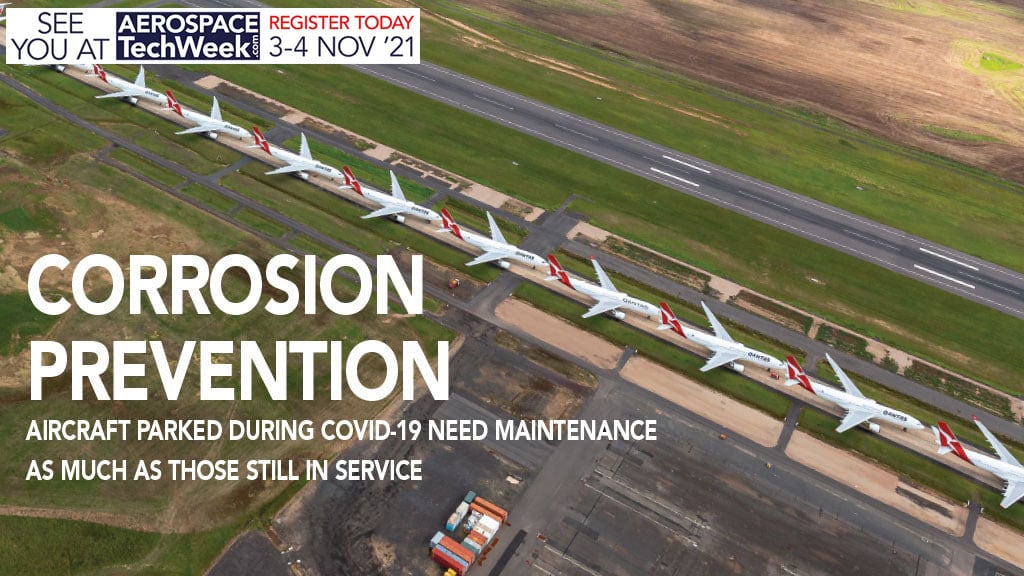To say that COVID-19 has been bad for the global airline business would be a serious understatement. According to an October 2020 ICAO presentation, the pandemic’s full year (January-December 2020) impact will slash gross passenger operating revenues by up to $96 billion worldwide, and reduce the overall number of seats offered by airlines up to 47 percent.
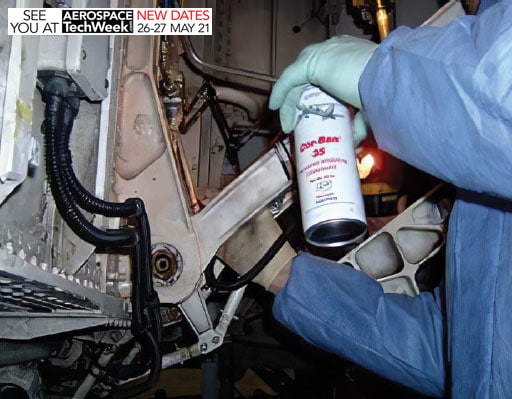
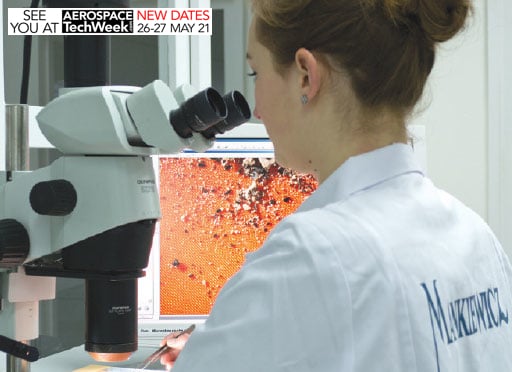
“The pandemic has put a huge financial strain on owners and operators, and they are doing what they can to reduce spending,” says Emily Romblad, customer marketing manager with Celeste Industries Corporation. This includes parking aircraft wherever they can. “Literally every carrier in the world has taken the majority of their fleet out of service for an undetermined period of time,” says Chuck Pottier, president of Zip-Chem Products.
Corrosion Doesn’t Spare Parked Aircraft
Parking aircraft to save money is a risky proposition. This because that airframes and their engines are highly complex pieces of technology that need to be regularly maintained, whether they are in daily service or indefinitely parked. In other words, aircraft are not cars. An airliner cannot be left unattended for weeks on the ground and then reentered into service as if no time has elapsed.
This is an inconvenient truth that some airlines are doing their best to ignore. They are so understandably desperate to staunch the financial bleeding that they are grounding aircraft first and leaving any subsequent maintenance issues for a later date, hopefully when COVID-19 has eased and air traffic is on the rise.
Unfortunately, this ‘park them where you can’ approach increases the likelihood of corrosion in airframes and engines alike. This is because “aircraft were being parked wherever they could find room in what might be less than ideal environments which could be hot and humid,” says Jon Jacobson, Av-DEC’s commercial technical sales team manager. ‘Hot and humid’ translates into environmental conditions that speed up corrosion on metal and other aircraft materials.
Fortunately, “since the beginning of the pandemic many operators have repositioned planes to more favorable dry environments,” says a Boeing spokesperson. “This has also improved resource and material availability for cleaning procedures and application of protective coatings.”
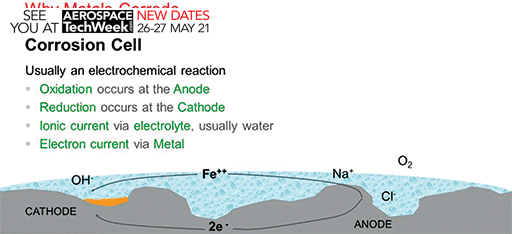
Daubert Cromwell image.
This says, aircraft still deteriorate over time in dry storage conditions. They just do so at a slower rate, especially if the cash-strapped airlines that parked them fail to do required maintenance. For instance, “some operators are opting to go longer between cleaning tasks or eliminating the task altogether,” says Romblad. “However, soils that build up on the exterior can actually accelerate corrosion, so it’s important to routinely clean to prevent the buildup of corrosion causing contaminants.”
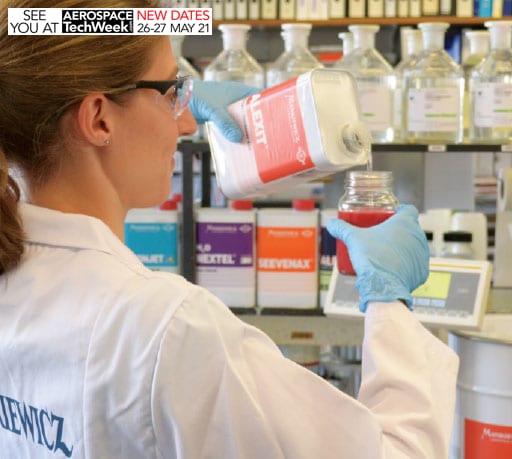
In fact, the long-term parking of aircraft has no negative influence on their exterior paint, says aviation coatings firm Mankiewicz. “UV radiation, humidity and temperature differences are much lower on the ground and therefore cannot harm the protective outer layer,” according to information that the company provided to Aviation Maintenance magazine. “Resulting dirt can simply be washed off and in the worst case the outermost layer, the clear coat, can even be polished.”
Engines At Risk During Parking
Aircraft engines are particularly vulnerable to corrosion when parked for extended periods of time, as is the case for many aircraft during COVID-19. “This new form of ‘medium-term’ parking presents risks,” says Ed Barnes, ExxonMobil’s global chief engineer for Aviation Lubricants. The reason: “Aviation turbine lubricants in commercial aircraft are overwhelmingly ester-based synthetic lubricants,” Barnes says. “These products have a natural affinity for water and absorb water vapor from the atmosphere at every opportunity. Once contaminated with water, turbine lubricants begin to form corrosive acids, which can become quite harmful to engine components over time.”
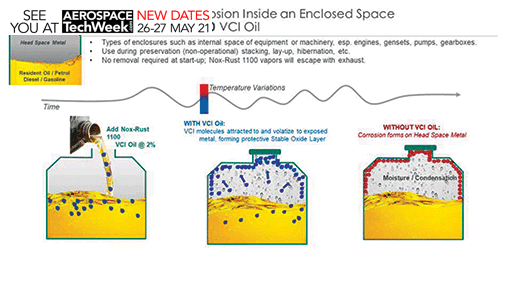
Exposure to elevated water contamination over time can also loosen deposits inside the engine’s lubrication system, he noted. This can present issues during test flights, or when the aircraft is returned to service.
Meanwhile, the practice of packing large numbers of parked aircraft into whatever space is available presents “an unusual challenge in itself,” Barnes says. “This crowding means engines cannot be operated or exercised and, consequently, water contamination may accumulate in their lubrication systems. Another challenge is personnel changes and ensuring there are enough people available to manage all this maintenance work.”
Other Vulnerable Areas
Most aircraft systems are vulnerable to corrosion during periods of extended inactivity. Some of the most vulnerable surfaces – beyond those inside aircraft engines – are fuel tanks, fuel and hydraulic lines.
For instance, the cavity of air above the fluid line is called the ‘headspace’. During normal operations the air within the headspace, which may contain moisture is frequently exchanged and exhausted. During idle periods air inside the headspace is not exchanged, and the moist air remains trapped in the headspace.
“Throughout the day the airspace heats and cools,” says Scott Kotvis, Daubert Cromwell’s vice president of Global Business Development. “Each time it cools, moist warm air condenses, creating water droplets that act as a corrosion electrolyte.” Airlines that use products like Daubert Cromwell’s Nox-Rust 1100 VCI Oil in such enclosures are protected from corrosion. But those that don’t may experience headspace corrosion in their aircraft, just by leaving them parked and doing nothing.
The Consequences Are Real
The unexpected consequences of storing aircraft quickly during COVID-19 were highlighted in July 2020, when the FAA released Emergency Airworthiness Directive (EAD) 2020-16-51 for all parked Boeing 737 Classic (CL) and Boeing 737 NextGeneration (NG) aircraft. It applied to the engine bleed air fifth stage check valve on the CFM56 engines that power the 737CL (CFM56-3 series) and the 737NG (CFM56-7 series) on aircraft that were stored for seven or more consecutive days.
“This emergency AD was prompted by four recent reports of single-engine shutdowns due to engine bleed air 5th stage check valves being stuck open,” says FAA EAD 2020-16-51. “Corrosion of the engine bleed air 5th stage check valve internal parts during airplane storage may cause the valve to stick in the open position. If this valve opens normally at takeoff power, it may become stuck in the open position during flight and fail to close when power is reduced at top of descent, resulting in an unrecoverable compressor stall and the inability to restart the engine. Corrosion of these valves on both engines could result in a dual-engine power loss without the ability to restart.”
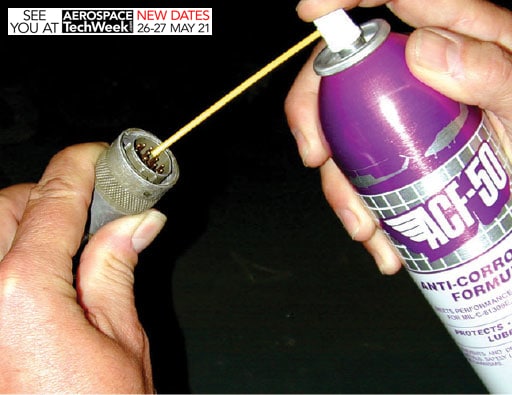
In other words, the corrosion on these valves could lead to B737CLs and B737NG’s experiencing dual engine failures in flight – just because they had been parked for seven consecutive days or more!
The life-saving remedy to this problem was simple aircraft maintenance, specifically “inspections of the engine bleed air 5th stage check valve on each engine and replacement of the engine bleed air 5th stage check valve if any inspection is not passed,” says FAA EAD 2020-16-51. The fact that maintenance solved the problem underlines how important preventative maintenance is during COVID-19, both before an aircraft is parked and then while it is sitting on the ground.
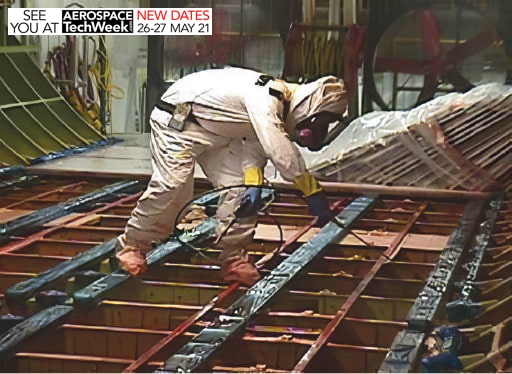
Protecting Parked Aircraft Through Preventative Maintenance
If there is a moral to the tale above, it is that aircraft require preventative maintenance prior to being parked, and then while on the ground until they are returned to service.
“Corrosion never sleeps, so if the aircraft is in storage of being flown it still needs to be on a corrosion protection program,” says Mark Pearson. He owns Learchem, which makes the ACF-50 (Anti-Corrosion Formula) lubricant that ‘creeps’ into the tightest seams, lap joints, and around rivet heads to displace moisture and corrosive fluids such as orange juice, Coke, and salt water. “Corrosion is like the insidious COVID 19 virus, except it causes havoc to the airframe, avionics and engines rather than to people,” he says.
Pearson’s point is echoed by Zip-Chem’s Pottier. “Airlines need to assess the condition of every airframe and powerplant that they plan to park for corrosion issues that need to be addressed,” he says. The place to start this assessment is by referring to the specific Aircraft Maintenance Manual (AMM) guidelines developed by the OEM and the operator’s engineering staff “to protect and preserve their aircraft for storage and subsequent return-to-service,” he says. In doing so, “they must be vigilant in the process.”
This approach is endorsed by Boeing. “The AMM Storage procedures (preservation tasks) provide detailed instructions on how to adequately protect the areas of airframe and engines that may be prone to corrosion,” says Boeing spokesperson. “These tasks include cleaning procedures, application of protective coatings and periodic repeat inspections. Boeing guidelines also advise operators to cycle engines on a set schedule which helps maintain the health of the engines and supporting components.”
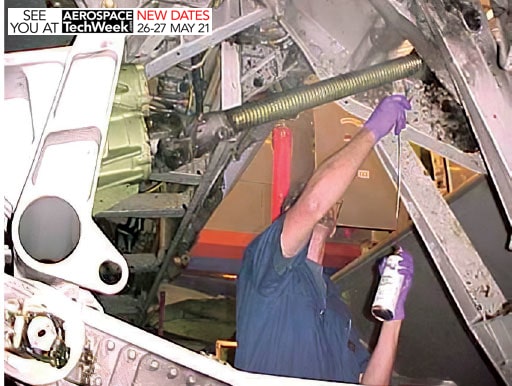
Taking Care of Airframes Before and During Storage
When it comes to taking care of airframes before and during storage, Simon Parnell knows what he is talking about. Parnell is aerospace sales manager for ROCOL, which makes aerospace lubricants and corrosion protection products that have been approved by commercial and defense OEMs/operators such as Airbus, Boeing, Rolls Royce and NATO. His company has also given serious consideration to the practice of parking aircraft during the pandemic, and has formulated some sound advice.
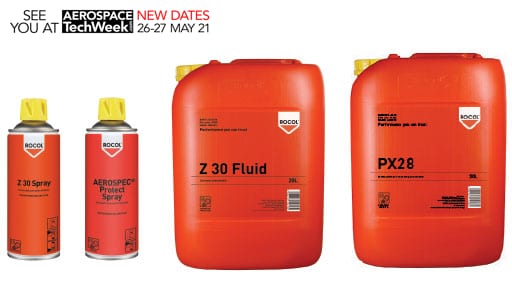
Before parking the aircraft, “the exterior should be thoroughly washed, with particular attention paid to wheel wells and landing gear to ensure the complete removal of any contaminants such as runway ice or snow removal compounds, sand and dirt to help prevent any corrosion issues,” says Parnell. “Once the aircraft has been fully cleaned and any corrosion removed or treated, carry out usual lubrication procedures using a general airframe grease or landing gear grease then apply corrosion protection compounds, particularly to unpainted metal parts.”
Once the aircraft has been parked, regular maintenance is a must. “If possible, inspect each aircraft on a seven-day cycle,” Parnell says. “A visual inspection every seven days that includes bodywork and protective coverings will highlight any corrosion damage that needs to be addressed through further cleaning, corrosion removal and the reapplication of corrosion protection compounds.”
That’s not all. A more detailed inspection of the airframe should be done every 14 days, with the inspector paying close attention to wheel wells and landing gear. Any corrosion that is detected needs to be corrected immediately to stop it from progressing further, while protection compounds should be reapplied as required. “Taking these proactive steps now together with a robust inspection routine will go a long way to keeping valuable assets flight fit for when they can be returned to normal service,” says Parnell.
Protecting the Engines
Maintaining aircraft engines is a top priority for ExxonMobil, and something that Ed Barnes has thought seriously about.
“To prevent water contamination and, in turn, the risk of corrosion, there are a few maintenance considerations,” he says. “First, engines on parked aircraft need to be periodically operated – long enough to heat the lubricant and drive-off any accumulated water contamination.”
The actual schedule for these periodic operations can be determined by consulting with engine OEMs, and will vary depending on where the on-wing engines are being stored. “For instance, if an aircraft is parked in a desert location it will take longer for water to accumulate in the engine lubricant because of lower ambient humidity,” says Barnes. “In this case, operating the engine for one hour every two weeks may be enough. However, thousands of aircraft are parked today in non-desert airports all over the world and their engines may require more frequent operation for various reasons.”
Fortunately, there are steps that aircraft maintainers can take to check engine health on their own. Specifically, “we recommend periodically testing the turbine oil for water (ppm) and monitoring the total acid number (TAN), and then comparing these to the levels set by the engine OEM,” Barnes says. “ If the water cannot be eliminated by engine operation, and water ppm or TAN are above engine OEM recommended limits, the operator has a few choices: Find a way to operate the engine more frequently, periodically change the lubricant to remove the water, or move to long-term preservation of the lubricant system by adding an approved preservative chemical to the lubrication system.”
Engine lip skins also need to be inspected and protected on a regular basis. “What some airlines are starting to discover is that water and moisture are getting trapped underneath the cloth cover or plastic wrap that are covering their engines in storage,” says Av-DEC’s Jacobson. “This moisture can start to lead to corrosion on engine lip skins, which can result in expensive and time consuming repairs.” According to Jacobson, there are a few commercially options available for sealing engine lip skins, such as Av-DEC’s SF2470 sealant that provides effective moisture barrier while being easy to remove prior to return-to-service.
Lessons Learned
The impact of parking aircraft quickly during COVID-19 has provided aircraft owners and operators with valuable lessons about the importance of preventative maintenance. A case in point: “The pandemic’s effects on commercial aviation have underscored the vulnerability of turbine oil to water contamination, and the resulting degradation of the lubricant,” says ExxonMobil’s Barnes. “We recommend airlines continue their focus on maintaining the integrity of their turbine oil.”
Other lessons may take a while to make themselves apparent. For instance, “many of the airlines are currently spraying disinfection spray into their cabins between flights, and the potential corrosive effects if any might be seen in few years,” says Av-DEC’s Jacobson. “Also, many of the aircraft that are currently parked due to Covid-19 and the 737MAX grounding will need to be re-inspected before they get put back into service. As these inspections occur new corrosion issues might be discovered on the aircraft.”
The bottom line? “As extended parking or storage has become the norm for airlines during COVID-19, we anticipate that those operators that have implemented a robust maintenance and corrosion protection regime will realize the benefits of lower costs and shorter lead-times to return fleets to flight,” says ROCOL’s Parnell. “Overall, we would like to think that operators will realize the value in using high quality corrosion protection products combined with a robust maintenance regime at all times.”
